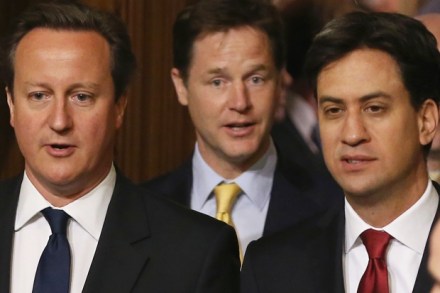Cameron, Clegg and Miliband head to Scotland to make the case for the Union
David Cameron, Nick Clegg and Ed Miliband are combining forces and heading to Scotland tomorrow to make the case for the UK. Here’s their joint statement: ‘There is a lot that divides us – but there’s one thing on which we agree passionately: the United Kingdom is better together. That’s why all of us are agreed the right place for us to be tomorrow is in Scotland, not at Prime Minister’s Questions in Westminster. We want to be listening and talking to voters about the huge choice they face. Our message to the Scottish people will be simple: “We want you to stay.”‘ The presence of the three party leaders





















